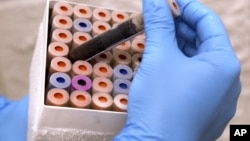WASHINGTON, DC —
Scientists have developed a blood test that can predict, with great accuracy, whether someone will develop Alzheimer’s disease. The test could someday help researchers develop drugs for the degenerative brain disorder.
There are no effective drugs to treat Alzheimer's. And the only way to positively diagnose someone with the disease is to use expensive, high tech brain imaging. A blood test would make diagnosis much easier.
Researchers analyzed blood samples from 525 people, aged 70 and older. Some of the participants had no signs of cognitive impairment. Others had memory difficulties, but no official diagnosis of Alzheimer’s disease.
Investigators measured the levels of more than 140 lipids or fats in the blood, identifying 10 that were altered in participants who went on to develop Alzheimer’s disease five years later.
Neuropsychologist Mark Mapstone, of the University of Rochester in New York, participated in the research led by scientists at Georgetown University in Washington, DC.
Dr. Mapstone said the lipid levels, which were lower in people who developed the brain disorder, were highly predictive of Alzheimer's.
“The biomarker[s] were able to detect at 90 percent accuracy those who would go on to develop the disease. But it is possible that some of these lipids are changed in other diseases. And we have not done that work and it needs to be done.”
For example, diabetes is common among older people, and other research has linked the metabolic disorder to an increased risk of dementia.
Dr. Mapstone said it will be a while before an Alzheimer’s screening test is available to the public. He said researchers want to look for a connection between the biomarkers and what happens in the brains of Alzheimer’s patients.
When the test does becomes available, Mapstone said people might want to take it to help them plan their financial future and investigate long-term care options ... if its results point to Alzheimer's.
“But without a treatment, the utility of this information is lower. When we have a treatment, then this particular sort of test will become very important because then we can use it to identify the people who get the treatment right away and hopefully we can do something about the disease,” he stated.
Dr. Mapstone said researchers developed the test with an eye toward finding and testing new drugs for patients with Alzheimer’s disease.
There are no effective drugs to treat Alzheimer's. And the only way to positively diagnose someone with the disease is to use expensive, high tech brain imaging. A blood test would make diagnosis much easier.
Researchers analyzed blood samples from 525 people, aged 70 and older. Some of the participants had no signs of cognitive impairment. Others had memory difficulties, but no official diagnosis of Alzheimer’s disease.
Investigators measured the levels of more than 140 lipids or fats in the blood, identifying 10 that were altered in participants who went on to develop Alzheimer’s disease five years later.
Neuropsychologist Mark Mapstone, of the University of Rochester in New York, participated in the research led by scientists at Georgetown University in Washington, DC.
Dr. Mapstone said the lipid levels, which were lower in people who developed the brain disorder, were highly predictive of Alzheimer's.
“The biomarker[s] were able to detect at 90 percent accuracy those who would go on to develop the disease. But it is possible that some of these lipids are changed in other diseases. And we have not done that work and it needs to be done.”
For example, diabetes is common among older people, and other research has linked the metabolic disorder to an increased risk of dementia.
Dr. Mapstone said it will be a while before an Alzheimer’s screening test is available to the public. He said researchers want to look for a connection between the biomarkers and what happens in the brains of Alzheimer’s patients.
When the test does becomes available, Mapstone said people might want to take it to help them plan their financial future and investigate long-term care options ... if its results point to Alzheimer's.
“But without a treatment, the utility of this information is lower. When we have a treatment, then this particular sort of test will become very important because then we can use it to identify the people who get the treatment right away and hopefully we can do something about the disease,” he stated.
Dr. Mapstone said researchers developed the test with an eye toward finding and testing new drugs for patients with Alzheimer’s disease.




